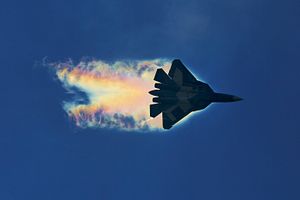Russia’s first indigenously designed and built fifth-generation stealth fighter, the Su-57, could be turned into a sixth-generation fighter aircraft, the former head of the Russian Aerospace Force, Viktor Bondarev told TASS news agency on November.
“This is actually a splendid plane and it can embrace both fifth-and sixth-generation features. It has huge modernization potential,” Bondarev, now chairman of the Federation Council Defense and Security Committee, said. “Importantly, it is the best among the existing versions by its stealth characteristics. It incorporates all the best that is available in modern aviation science both in Russia and in the world,” he added.
As I reported in July 2016, Russian defense officials have repeatedly claimed that hardware elements designed for a future sixth generation fighter have been tested on the Su-57 prototype, including flight and navigation systems as well as advanced electronic warfare and radar systems.
Russia revealed for the first time the design of a new sixth generation fighter aircraft in March 2016 (See: “Russia Reveals First Design of New 6th Generation Fighter”). The new aircraft is slated to be available in manned and unmanned configuration, and could take to the air for the first time in the late 2020s, according to Russian defense officials.
Meanwhile, work on the Su-57 is continuing. Bodarek cautioned that it will take time for the new aircraft to be introduced into service. “In the first year, the Aerospace Force won’t get 20 or 15 planes. It will get only two or three and so on,” he said on November 1. The service is currently testing nine Su-57 prototypes with two additional aircraft expected to be delivered to the service by the end 2017.
Doubts remain as to whether the Su-57 is genuinely a fifth-generation fighter aircraft. The Su-57 reportedly is a multirole, single seat, twin-engine air superiority/deep air support fighter poised to replace the Russian Aerospace Force’s MiG-29s and Su-27s. “The Su-57 will be armed with beyond visual range air-to-air missiles as well as of air-to-ground missiles including the extended range Kh-35UE tactical cruise missile,” I explained previously.
It can also be armed with nuclear-capable cruise missiles.
One of the chief technical problems that still need to be resolved is designing and producing a next-generation engine for the Su-57, as I noted:
As of now, Su-57 prototypes are equipped with a derivative of the Saturn AL-41F1S engine, dubbed AL-41F1, an engine also installed on the Sukhoi Su-35S Flanker-E.
While the Su-57 was slated to conduct its maiden flight this year, a new engine— the next-generation Saturn izdeliye 30 — will reportedly not be ready until 2020.
According to Russian defense sources, experimental design work on the Su-57 will not be completed until 2019.































